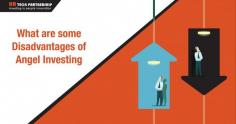Angel investing is a win-win option for both investors and startups that seek and utilize these funds. Investors can choose to invest smaller shots of capital, select their portfolio, be patient with their investments, obtain massive tax benefits in the UK, leverage their personal expertise to add value to the companies they are investing in and participate in innovation hubs with the handholding of experts like HR Tech Partnership. Startups also get access to patient capital and add to their intellectual capital before they graduate into bigger leagues. However, Angel investing has its own share of risks and disadvantages.
Optimizing Risk V/s Return
Each investor has his own risk appetite. This appetite, in conjunction with the risk versus return equation, determines an investor’s portfolio or investment spread. However, angel investing is a relatively new and unexplored option. There is a limited depth of data and performance track record for angel investments. So it is difficult to derive a risk-return optimization model for angel investing or predict outcomes with a certain degree of accuracy or assign a risk premium. On the other hand, surveys of prospective angel investors point to the fact that ‘expected returns on their investments are very important for them and a crucial component for their decision making. 4% of the survey population designated this factor as unimportant, which points to its criticality.
Along with the rate of return or premium of a certain investment, the speed at which the return happens and the liquidity potential of the investment at any moment in time are also important factors. A quick return and available liquidity options attract investors to an opportunity. But angel investments, by their very nature equal to patient capital. Angels are aligned to the long-term vision of a company and stick with their investments. Market surveys tell us that 70% of angels stay invested for up to 7 years, with 57% for up to 5 years. So angels, most likely, look for midterm exits or liquidity options. This can pose a challenge in the case of angel investments.
Investments are focused to achieve maximum returns on exits
Investments in general, and early-stage investments in particular, by their very nature, are exit focused. This is because investors achieve maximum returns during bumper exits. It offers both investors and entrepreneurs an opportunity to be happy and satisfied with their performance besides quantum cash gains. Secondary markets offer a good way to offload one’s investments and look for potential buyers without waiting for a big exit event like IPO or sale of business or similar. But, for angel investments which are unlisted, this is a challenge and quite difficult to achieve. This gives additional pressure to entrepreneurs who have to succumb to premature exits just to keep the investors motivated.
The London based HR Tech Partnership is an investment venture in the People Tech space with most of its stakeholders being senior corporate directors. The company is an early stage investor and focuses on companies which leverage data and analytics to help organizations around Talent and Workplace productivity. It believes that advancements in the latest technology can be useful for disrupting conventional people practices and enhancing productivity.
To know more about angel investing and learn how one can manage the disadvantages better visit http://www.hrtechpartnership.com


